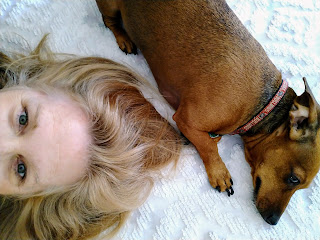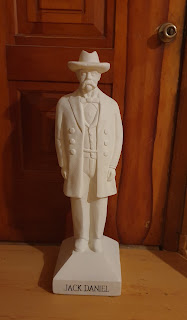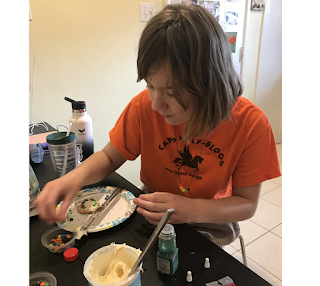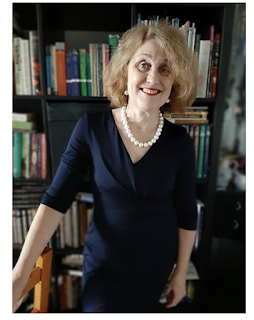This is the time of year when I do a lot of thinking.
Navigation menu
Thursday, December 30, 2021
End of Year Thinking
This is the time of year when I do a lot of thinking.
Wednesday, December 29, 2021
Why (And How!) to Keep a Writer's Notebook
Open any writer’s notebook and you’ll find a unique ecosystem, populated with lists (of books, birds), quotations, diary entries, overheard dialogue, memories sparked, striking images, sketches, and memorabilia. Some notebooks might even contain actual writing! Ask any writer how they use their notebook, and you’ll get a different answer. Amit Chauduri writes back to front—notes at the back, with the first pages free in case he starts a novel. Carolyn Forché periodically transfers the sparkiest passages from past notebooks into a new one, which becomes dense with poetic possibility.
While they fill them assiduously, many writers don’t use all of what goes into their notebooks. Much of what enters my own notebooks never leaves. Joan Didion, who wrote a whole essay on notebooks, said that her old notes “seem marginal at best.” But the list of famous writers who keep notebooks is nearly as long as the list of famous writers: not just Didion and Forché, but Thomas Hardy, Henry James, John Steinbeck, Mark Twain, and on and on. So they must be on to something.
If not as a record to return to, or fruitful ground bearing the rough drafts of their next masterpiece, why do writers keep notebooks at all?
It’s helpful to think of your notebook not as a curated repository for your undiscardable thoughts but as an integral part of a private process: your mind thinking on paper. Novelist Lawrence Norfolk says of his notebook that while it may not be useful in a utilitarian sense, it’s significant because “work passes through it on the way to becoming something else.”
However you use it, your notebook is the surest portal into yourself as a writer. It’s not a library you must keep organized, but a doorway you must keep open, to keep writing vivid and alive in your life.
Convinced? Good. Here’s a few thoughts to get you started in your habit:
The Format:
Sketch book, Word document, or scratch paper? Lined or unlined? I use apps when I must—typing and recording—but I usually use an unlined, softcover Moleskine. There’s a reason most writers use physical journals. “To me, typing is like work,” Neil Gaiman said, while “writing with a pen is like playing.” More scientifically, handwriting (versus typing) can connect us more deeply to our emotions. Virginia Berninger, a professor at the University of Washington, explains that “when we write a letter of the alphabet…that process of production involves pathways in the brain that go near or through parts that manage emotion.”
The Purpose:
Will you write whenever you feel “inspired”? Or create a more consistent practice? Will it be a notebook for brainstorming/project notes (like an artist’s notebook or scientist’s field book—as DaVinci and Darwin famously kept)? Will it be a place to write? Or a place to write about writing (a la John Steinbeck)? Or a brain dump (a la Julia Cameron) on the way to the “real” work? (Mine is a little of all of these, depending on my mood an project.)
The Process:
Can you journal every day at the same time? Or in the same circumstances every time (those free Saturday afternoons while the kids are napping)? Keep your notebook handy for whenever the mood strikes, but also consider an accompanying ritual to help firm up your habit—as simple as a cup of tea and a particular chair, or as complex as drawing a tarot card or speaking a spell.***
Leah Claire Kaminski holds degrees from UC Irvine and Harvard. For nearly 15 years she’s taught students to read with attention and to write poetry, academic essays, and creative nonfiction. Leah’s poetry and stories are widely published in magazines and anthologies, and in two chapbooks, Root (Milk and Cake Press, 2022), and Peninsular Scar (Dancing Girl Press, 2018). Her collection Live oak nearly on fire has recently been named a finalist for the Laureate Prize from Harbor Editions and the Paul Nemser Prize from Lily Poetry Review. She’s at work on a new collection, Small Continent of Light, and is also at work on a horror novel. Originally from Miami, Leah lived in Boston and Orange County, California before recently relocating to Chicago with her partner, child, and two cats, Bernie and Betsy. She loves writing, and teaching writing, because the page never judges. Visit her website at www.leahkaminski.com.
Leah is also a WOW! Women on Writing instructor. Check out her upcoming workshop, WHY DO I WRITE?: (Re-)Discover Your Drive, starting January 10th!
Monday, December 27, 2021
Family
These days, the term family has morphed into a larger circle. Or perhaps to be more accurate, the concept of family has been enlarged to include smaller circles of people who have no blood or marital relation to each other.
Why? Why are we are we venturing out and cherry-picking family members, instead of simply being satisfied with the family we were saddled with born or married into? Why are we calling people our work family and our writing family and our neighborhood family?
Necessity. These days, our true family members are scattered. Our real families are sometimes fractured and sometimes dysfunctional. To get the support and joy we need, like making something out of Lego, we have to build our own family, one brick at a time.
This holiday season, a few things happened that made me reflect on what family is to me. First, a group of teacher-writer friends got together at El Toro for our annual holiday party. If you've never heard of El Toro, that's not surprising, since it's a teacher-friend's lower-level bar set up in his home.
Rob--a high school teacher and also a stand-up comedian--hosted the gala affair. Do the math: 140+ bottles of various alcoholic offerings. Seven or so stressed-out and so-ready-for-a-break teachers. Some crockpot chili. Some killer artichoke dip. Some hideous white elephant gifts. Lots of fast-paced conversation and lots of laughter.
Also lots of instances of getting it. Instantly getting each other's moods and struggles and successes without hours of explanation.
This is what I was thrilled to get from our white elephant exchange:
When I opened the above gift (from my daughter), I laughed. When everyone else saw what it was, they were confused. They haven't read my book--not interested in it, I guess. They looked at my daughter and me for an explanation.
"It's an inside joke," Virginia said, and she's right. It's inside all the circles of people who get me. I'm working on a screenplay... I envision my book being made into a movie... People who know me know that.
Crosby, Stills and Nash sang a song with the lyrics/title "Love the one you're with." Surround yourself with people who love you and get you. Make sure the people who are around you give you joy, along with everything else you need, because you just might need it in 2022...
May the next year be the year for you.
Sioux Roslawski is a a middle-school teacher, a freelance writer and a novelist. Check out her book (Greenwood Gone: Henry's Story) on Amazon.
Saturday, December 25, 2021
Holiday Card Message Inspection from a Past-Wannbe Greeting Card Writer
- Wishing you a warm and snuggly, cozy, happy holiday. This card has an illustration of a mouse sleeping on top of a present, with some striped pjs on. I suppose he (or she) looks snuggly on the front of the card--definitely cute, but it wouldn't do to say: wishing you a cute, happy holiday, right? And the sentiment is nice. However, in St. Louis, it is unseasonably warm weather, so no one will want to be cozy in front of a fire with footie pajamas, or we'll look like we've been in a sweat lodge.
- What a year-2021. That about says it all, right? Here we are, still in the thick of the pandemic, and with the same questions we've had all along--what is it okay to do? But this card giver had a great idea and took this message in a much more positive spin--she put super cute photos of her family all over it with all the fun things they did in 2021. So she meant: What a year! (YAY!) Not: What a Year. (I'm so stressed out.)
- Season's Greetings: Hope You Enjoy Every Happy Thing This Season Brings: There's a little rhyme going on in this one, which is nice, and this is a good sentiment. This season does bring a lot of happy things, especially since I'm the mom of an 11-year-old who loves presents and a dog, who loves to try to help unwrap presents. And cookies--we made cookies which, of course, bring much happiness! (See photo above of 11-year-old decorating cookies!) But I know that if I was writing this card, I would have tried to make it much more complicated and come up with something other than THING. Event? Moment? Gift? Okay, thing it is.
- One more...I know this study of Christmas cards is fascinating...Snoopy and Woodstock are on the front, with Snoopy giving Woodstock a gift. The inside says: May the gifts of Christmas bring you happy moments and happy memories. Repeated the word happy in there--and the advice I've been giving and received forever, when writing a story or essay: don't repeat words, unless it's for rhythm and use words more precise than "happy." But it looks like Christmas and happy are together in the greeting card world. Because this is the second card (and I'm sure there are more) with happy on the inside, and in this one, they used it twice. I wonder if they could have used the rule of three and come up with: May the gifts of Christmas bring you happy moments, happy memories, and happy mimosas ? (Sticking with the m alliteration too...)
Thursday, December 23, 2021
Chasing Those Bright, Shiny Objects
 |
| Photo by Harry Cooke from Pexels |
Tuesday, December 21, 2021
Interview with Alaina Grimm, 2nd Place Winner in the WOW! Summer 2021 Flash Fiction Contest
Alaina Grimm began writing as a child. Her first full length story (Historical YA) never made it beyond a laptop and a large three ring binder. However, she still keeps a copy of it and the plethora of fractured fairy tales she wrote as a teenager in one of her many bookcases. She has written two other unpublished fantasy novels and is working on outlining her third. She works for a software development company by day and delves into writing stories in her fantasy worlds at night. Alaina and her husband have 2 wonderfully spoiled rescue dogs. She can be found on Twitter @alainagrimm or learn more at alainagrimm.com.
Monday, December 20, 2021
A Lesson about Names
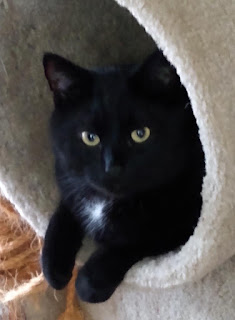 |
| Meet Newton |
Recently my family adopted a new cat. He's new to us but, at about two years-old, we are his third home. We promised to take him in when a friend moved and then they told us his name. Apparently, we had invited Lucifer into our home.
After we were told his name, we were also given a list of warnings. He's aggressive. He's a pest. Will he take down the Christmas tree? Who knows. He's never seen one.
But as we've gotten to know him, we've realized something. Lucifer is a horrible name for this curious, playful cat. After trying out approximately 4,692 names, we're now calling him Newton aka Newton the Ninja.
What does this have to do with writing? Quite a bit actually because names bring expectations.
Your Writing
Your Characters
Yourself
Sunday, December 19, 2021
Melissa Knox Returns as a Runner Up in WOW!'s Creative Nonfiction Contest: An Interview
Thursday, December 16, 2021
Getting Back Into the Habit of Writing Again
Until this past weekend, of course.
I really didn't have it in me to do anything creative this weekend but I thought of advice I came across where someone said they just wrote 100 words a day. And well, I figured I can manage that, so I brought up my phone and took out an app I used in the past to write stories, and I opened up a story that I've been meaning to return to for months. And I wrote. Honestly, I think I got 50 words down, but that's 50 more new words that I wrote than I did the last few months.
It felt weird to write again, to be honest. This year has been stressful for a variety of reasons. Finally, though, this past month I found a job and I think the cobwebs of worry cleared a bit, allowing me to continue some creative projects.
This led me to think about how I approach things creatively lately. Earlier this year, in January, I wrote in my notebook, but this time around, I'm pulled towards the blueish glow of the digital screen. Even in the midst of my revision process, I still examine, edit, and rewrite my story on my phone.
I have a few bits of advice for those of you who are trying to see what works for you creatively lately.
- Try a new method of writing. If your last plentiful season of writing included notebooks and pens, break out your digital device instead. It feels like a fresh start when you use a method of writing that's the opposite of when you were last successful.
- Return to something familiar. I dragged up a story that I had left off halfway finished. While I may not stick with it until the end, it got me back into the mode of writing new stuff again.
- Do a little bit each day. I'm not a fan of word count goals but try and do something with your writing each day. Revise a sentence, write a new paragraph, and jot down a new idea or two. Re-read your favorite book of writing advice. Do something just a little bit each day that moves your writing forward.
- Don't get too down about your progress. Because as long as you are still pursuing and trying, it's progress! If you have been away a while, all that matters is getting back into the habit of writing again.
Wednesday, December 15, 2021
Putting Yourself First (AKA Self-Care) and Life Glows On
Margo L. Dill is a writing coach, publisher, author, and editor, living in St. Louis, MO with her daughter and dog. Check out her editing business here and the classes she teaches for WOW! here.
Tuesday, December 14, 2021
Interview with Kaylie Hatch, First Place Winner of Summer 2021 Flash Fiction Contest
interview by Marcia Peterson
WOW: Congratulations on winning first place in our Summer 2021 Flash Fiction competition! What prompted you to enter the contest?
Kaylie: Thank you so much!! It still doesn’t feel quite real to be honest. I can’t believe I won!!
I’ve been writing for a long time, and while I have always been serious about it, I’d never entered any official competitions before. One day I just decided I really wanted to enter a flash fiction contest and yours came up. Yours was certainly the most appealing. Even just reading the rules the competition felt very personable. I really loved your option to receive critiques too. it’s been a wonderful experience all around.
WOW: Love to hear that! Can you tell us what encouraged the idea behind your story, “The Dressing Room?”
The one thing I know for sure it was inspired by was something in one of Terry Pratchett’s works. In Witches Abroad there’s a scene where Granny Weatherwax becomes trapped in a prison of mirrors. Death tells her that she will get out when she finds the one that’s real. She looks down at herself and says “this one.” I always found that idea extremely powerful, and had wanted to do something similar for a long time.
I’m sure it partially came from being someone who struggles with anxiety and self-image too, and knowing there were others around me who struggled with similar issues. But ultimately I think probably everyone has that one thing they want to be more of—more beautiful, more intelligent, more powerful, happier, etc.
I had this idea of a dressing room where you could “dress” as another version of yourself, rather than clothes. I liked this thought of someone being able to bring their desires to change themselves into fruition. The power of the dressing room is a horrible one, really. It’s the kind of thing that looks wonderful on the surface—you get to be the best version of yourself—but in practice…how much of you—the you who walked into that room—would you lose in picking another version of yourself? Which version of yourself is the one who walks into the room? What quality do you possess most abundantly? What if the version of yourself who walks into the room doesn’t possess one quality in particular, but rather already has all those qualities you want, and you don’t even realize it? What if you’d lose more than you gained by choosing a single version of yourself?
So this story is kind of my encouragement to anyone who looks in the mirror and sees something they want to change about themselves. That perhaps you are already the best version of yourself.
WOW: That's a great message. What do you enjoy about flash fiction writing versus the other kinds of writing that you do?
Kaylie: It really was that other writing group I’m in that sparked a passion for flash fiction in me. (The group is called Tale Foundry, if anyone’s curious). I joined it in early December last year. Previously I would write in the opposite direction—my pieces would be very long, sometimes too long. But I liked this idea of writing a piece every week, and was willing to stretch my limits to get everything I wanted to say into the small word limit. I expected the word limit to be a burden, but after doing that for a year I’ve become rather fond of it. I really enjoy the challenge of it. I think it’s helped my other writing a lot too because it’s taught me how to edit much faster, and say what I want to say in a more concise manner—as well as simply help me figure out what I truly want to say in the first place.
WOW: Can you tell us what projects are you currently working on? What can we plan on seeing from you in the future?
Kaylie: I’m always working on a lot of things at once, but what you can probably expect next from me is I’d like to begin submitting short stories to magazines. I’m currently working on a science fiction story. I’ll probably also continue to submit flash fiction to competitions (probably even to more of yours) too!
WOW: Thanks so much for chatting with us today, Kaylie. Before you go, do you have a favorite writing tip or piece of advice you can share?
Kaylie: It has more to do with critique, but honestly the best piece of writing advice I ever got—and I regularly give this advice to other writers—is that other writers will often critique you based on how they would have written the piece.
When I was starting out, I thought I had to take every critique given me—that other people would obviously know better than me. But one day someone critiquing me paired her critique with that piece of advice and it kinda changed my life.
I realized that other people didn’t by default know better than me. They're people too, with their own styles and preferences. I was allowed to look at their critiques and go “would changing this benefit the piece as a whole?” and I was allowed to say “no.” Because that’s what matters: what benefits the piece.
Now that’s not to say you should blow off every critique you get, certainly not. Like I said, ask yourself if taking the critique would benefit the piece. Sometimes it will. But other times it’s just a stylistic choice and you’re free to take pride in the choice you made.
There is so much writing advice out there, but after around fifteen years of writing, I’ve found that almost every “rule” people make about writing isn’t truly a hard and fast rule that applies in every situation. (Like, people say you shouldn’t use adverbs and passive voice. There is absolutely a reason people say that, and you should pay good attention to when you’re using either, but you can certainly use both to great effect as well).
All that to say, as weird as it might sound, the best piece of writing advice I have is…sorta, don’t give others’ advice too much power over you. Know that it’s your writing. And your writing journey. I’ve found people tend to learn those writing rules I mentioned before with time, but only through learning how those rules work through their own writing.
So in a nutshell…be true to yourself, and be willing to go on your own journey with writing. Learn to enjoy your writing first and foremost.
Thank you for chatting with me!! As well as for all the support!! I’ve had such a wonderful time participating in this contest!!
****
For more information about our quarterly Flash Fiction and Creative Nonfiction Essay contests, visit our contest page here.
Monday, December 13, 2021
It's The Most Wonderful Time of the Year?
Yes, I know the holiday season is hectic and stressful with plenty of not-so-very-merry moments, but it’s my favorite time of the year when it comes to my writing path, career, or whatever I’m calling it these days. Because December is when I do a slow roll, take some deep breaths, and review…well, me.
Sunday, December 12, 2021
Interview with Diana Friedman, Q4 Creative Nonfiction Contest Runner Up
interview by Marcia Peterson
WOW: Congratulations on your top ten win in our Q4 2021 Creative Nonfiction essay competition! What prompted you to enter the contest?
Diana: I found WOW on a list of publications recommended for short pieces. I was immediately drawn to WOW because I could see by the diversity of essays that you publish that your primary metric for judging is truly “quality of writing.” Many literary journals state that they are looking for something “fresh” and “new,” or that “wows” them, but with many of these publications you have to figure out how to match their specific aesthetic, which I find difficult, and to be honest, a bit tedious. For this piece, I wanted to tell a story in my own voice, and WOW seemed to be a place that accepts a wide variety of styles and voices, so I’m delighted you took it!
WOW: I loved your entry, “My Summer of Love,” and I felt like I was there watching and listening to everyone as you did. What inspired you to write this particular piece?
Diana: It originally started as a brief anecdote about my father dumping the butter-bowl on my mother’s head—a story which, by the way, remains legendary in my family!
After finishing the first draft I realized that some “child” part of me still felt anger and resentment at my parents for divorcing and disrupting what had felt like a happy childhood, given all of the freedom we had and the love we felt during the time the story takes place. As I rewrote, I realized the piece was not just about the anger but about that love. And also about how a child of nine or ten can’t fully interpret what’s going on when adults are not quite behaving like adults. So, the first challenge was to try to convey how I, as that child, struggled to make sense of that moment.
Now, when I look back on what was going on at that table, I could write a very different story, for example, my parent’s inability to work out their problems in a mature way, which, as I just mentioned, is where the piece started. But as I rewrote the story, I really wanted to make it about both; how love can be messy, but also magical, especially in those moments when everyone feels so united. How as an adult, you can look back at the family disfunction and still hold two conflicting ideas at once. I mean it sincerely when I say that those crazy times were some of the happiest of my childhood because there was so much love everywhere.
I think I was also motivated to revisit that era because of all the recent political events—the polarization of the country, the hatred spewed on social media, the way the pandemic has divided us into those of us who feel we care about the safety of the group versus those screaming about their individual rights to not wear a mask even if it means harming others. All of that has left me nostalgic for my experience of the early 70s when there didn’t seem to be so much venom. I miss the feelings of permissiveness and freedom. In my family that permissiveness filtered down to my brothers and me, and I am grateful to my parents for the freedom they gave us to explore.
WOW: You co-facilitate creative writing workshops in Spain, which sounds fabulous. What would you say are the main benefits of attending a writing retreat?
Diana: The first time I attended a writer’s retreat, I was amazed by the volume of work I accomplished. In just seven days I stripped down to the bone a draft of a novel and restructured 200 pages; at my second retreat I rewrote five chapters in under a week.
But retreats are not just about the sheer volume of what you produce; the growth you experience as an artist when given the opportunity to focus uninterrupted on a creative project free of family, work and general responsibilities is unparalleled. At a writer’s retreat, with no phone, children, bills, leaky faucets, etc., I experience what I call the “unweighting,” which comes from the lifting of the 24/7 responsibilities. For me, this unweighting provides access to an internal silence, and it’s into that silence that my ideas for plot and theme and conversations with characters all pour unbidden. Having access to that deep well where ALL of my thoughts are on my work and my work only, allows me to create at a level far more profound than anything I can accomplish at home.
Iaulin borda, the farmhouse where we have the Pyrenean Creative Writing Retreat, is without question my favorite place in the world to write. I am not exaggerating when I say it is unparalleled in terms of inspiration and beauty. The bedrooms look out over a lovely garden at the base of the hill; beyond that is a majestic view of the ‘hobbit-like’ farmlands of the Basque Pyrenees. Every morning, you open your curtain to a new landscape sculpted by the shape of the fog, the temperature and the position of the sun. Throughout the house, there are nooks and crannies to focus on your work. And when you need a break, you can soak in the views from the terrace or the dining room, or, simply head out on one of dozens of walks that takes you around the mountains or down to the villages with medieval church spires and terraced fields.
I’m very excited to be co-leading this retreat. It’s designed for writers of all levels of experience. We have optional sessions in the mornings to discuss building blocks of story for newer writers, along with writing prompts to help get creative juices flowing. The rest of the day is free for writers to work as they choose, until the evening when we gather around the dinner table where we work together to help each other power through setbacks, discuss writing blocks, and equally important, celebrate triumphs.
Oh, and the food—local Basque and Spanish cuisine—is fantastic. Plus, the wine is unlimited. What’s not to love about any of that?
WOW: It sounds wonderful! Can you tell us what projects are you currently working on? What can we plan on seeing from you in the future?
Diana: My main project right now is a novel set in Spain. After months of research, I’m on the verge of finishing a first draft and it feels like a house under renovation; screws and faucets and wood planks and drywall scattered everywhere. How on earth will I get all the pieces into place? Next year—2022—I’ll be focused on taming the story into a piece of work that readers will want to read.
I also have a number of essays in the pipeline that focus on contemporary issues such as the environment, my family, a long-ago sexual assault, and getting caught in Spain with my son in 2020 during the first wave of the pandemic.
WOW: Best of luck with the novel and your essays! Thanks so much for chatting with us today, Diana. Before you go, can you share a favorite writing tip or piece of advice?
Diana: Don’t get complacent. In order to keep growing as a writer, work on the aspects of writing that are hardest for you. For me, that’s revision, because I know that when a piece is ready to send out, rejection will always be around the corner. For this reason, I tend to let many pieces that are almost done gather dust on my computer rather than deal with the fear of rejection. It’s very easy to be self-destructive as a writer, and this is definitely my weak spot.
To counter this, my goal for 2022 is to submit enough short pieces to enough outlets that I can receive 100 rejections! While I certainly hope I receive some acceptances in there, setting 100 rejections as a goal will push me to get my work out into the world faster than I usually do, and, I hope, push me to get past what’s hardest for me.
For more information about our quarterly Flash Fiction and Creative Nonfiction Essay contests, visit our contest page here.
Saturday, December 11, 2021
Tell, Don't Show
Like all writers, the mantra Show, don't tell has been drilled into my head for decades. It's also what I try to instill in my middle-schoolers. Don't tell the reader your character is angry. Show the reader. What's going on with the character's breathing? Is their face getting red? Are they clenching their fists? Are they pacing?
I also depend on internal dialogue to flesh out a story. The thoughts that are swirling around in a character's head add so much to a piece. Every instant, we're having a conversation with our self--in our head. Letting the reader in on a character's internal workings enriches a book.
Scripts are different. Way different.
When writing a screenplay, the writer has to tell what the viewer will see--in a straightforward way. Usually, I try to paint pictures with words. Flowery phrases. Similes. Metaphors. Alliteration.
In a script, you don't need no stinkin' similes. In a bare-bones fashion, the screen writer has to tell what the camera sees... what the actor does. And that's it. The goal is to create a visual and emotional moment. Actually, the goal is to create a whole string of emotional and visual moments.
If you're curious how writing a novel is different from writing a screenplay, you can read this article.
I'm halfway through a first draft of a script. I'm transforming my novel, Greenwood Gone: Henry's Story, into a screenplay. While at a writing retreat, a writer friend asked me if there were directors interested in it. Of course. Have you heard of Martin Scorsese? Denzel Washington? Steven Spielberg? The three of them are in a bidding war.
Just kidding. But I can fantasize, can't I?
The good news: there are screenwriting programs that help you with the formatting. I'm using StudioBinder. After getting accustomed to what I initially thought of as wonkiness, I've found it's almost intuitive. After typing up a bit of action, the program automatically switches to a character and dialogue. Or does it? Is it simply me that has gotten into the scriptwriting groove?
I'm not sure.
I started this as my NaNoWriMo project. A finished screenplay is going to be much tighter and way less textier, so even if I had finished it by November 30, it still would not have been 50,000 words long. I told myself that if I got to the end of the book by the end of November, I'd consider NaNoWriMo a success.
I failed.
However, the way I look at it is this: I have half of a rough screenplay done, and that is a half of a screenplay more than I would have had if I had not done NaNoWriMo.
It's good to be a cup half-full person...
Writing friends--I see some of your pieces as future movies. Seriously. Pat Wahler: Your book I am Mrs. Jesse James would make a superb movie. Linda O'Connell: The memoir I keep bugging you to write? It would make an incredible movie. Renee Roberson: You have dozens of real-life stories about missing people. Your lovely voice narrating the haunting episodes? It would be a definite winner. Angela Mackintosh: The memoir/novel you're still writing (and I haven't even read, but I know it will be mind-blowingly brilliant when it's finished) would be perfect for the screen.
Just sayin'.
Sioux Roslawski is a freelance writer, the proud author of Greenwood Gone: Henry's Story, a rescuer of dogs and a middle-school teacher. You can check out more of her writing on her blog.
Wednesday, December 08, 2021
Completing NaNoWriMo 2021
In my last blog post I wrote about how this year’s NaNoWriMo project was going. In mid-November, I was on track to complete my goal of 60,000 words. The novel is a suspense thriller set in a fictional town in North Carolina. It features a young woman who hosts and produces a podcast about people with survival stories, from kidnappings to domestic violence and everything in between. She is also investigating the disappearance of her older sister, who went missing from the summer camp she worked at when the podcaster was still in high school. I don’t have an official logline or elevator pitch for the book yet, and only a placeholder title. I had the fifteen story beats outlined when I began, but many elements of the story changed almost immediately.
Tuesday, December 07, 2021
Should You Be a Specialist or a Generalist?
Some people in the publishing community will tell you that the only way to be a successful writer is to specialize. If you are a poet, you need to focus on poetry. If you are an essayist, do not tinker with novel writing! Write essays. Picture book writers should write picture books and so on.

